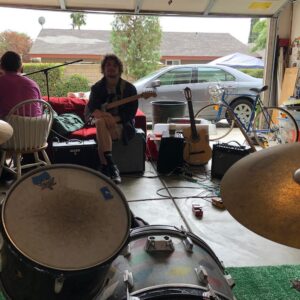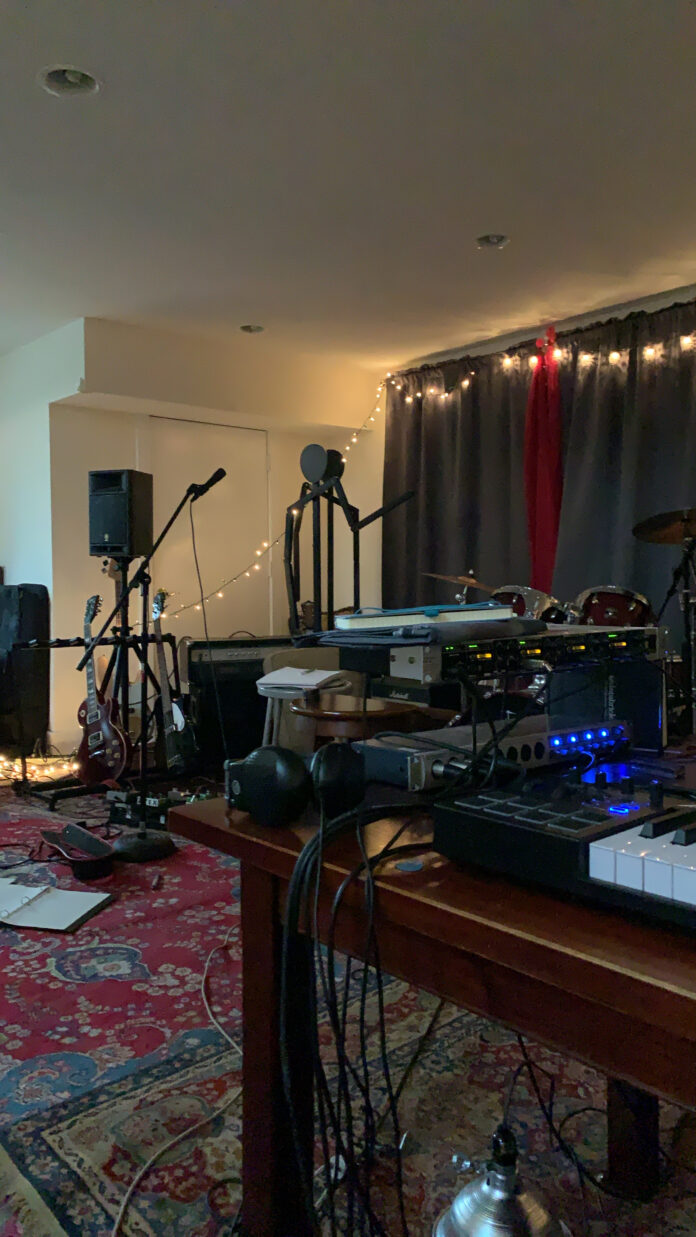COVID-19 has presented Occidental’s student musicians with both challenges and artistic breakthroughs. While some student musicians have enjoyed the process of creating music in isolation during the pandemic, others long for in-person collaboration and performing live. These six musicians discuss how they had to alter their lifestyles, artistic processes and goals to remedy the new challenges of quarantine.
Coping with quarantine
When campus closed March 2020, bassist and songwriter Julia Hansen (junior) stopped writing a song, “I Won’t Get Stuck in the Doldrums.” She said it was a way for her to try to cope with the uncertainty of returning to Occidental in the fall. She said the song was simply too sad to release.
When Hansen attempted to write love songs, she said they were too juvenile considering the severity of COVID-19. She opted to take a break from songwriting and learn more about the production software Abelton. Hansen said she worked on bass originals and looping different sounds, which preserved her creativity without the stress of songwriting.
Quarantine was also a huge adjustment for multi-instrumentalist Olivia Oosterhout (senior). She said she did not make music over the summer, and it was difficult for her to collaborate with others virtually.
“It was so hard to get motivated and have a creative process, but I know for a lot of other people it was a perfect time to make music,” Oosterhout said.
In contrast, Dilin Massand (senior) said he has produced many instrumentals since quarantine started. Massand mixed an unreleased EP, “Phases,” after he left Occidental in March. He said he has since continued to tweak the EP, with the intention of developing it into an album.
“Music is kind of like journaling for me,” Massand said. “I’ve found that isolation is not really a bad thing, because I always make the best music sitting in my room by myself, and so having to do that for five months was pretty cool.”
Massand said he and Oosterhout have been collaborating remotely, and she has helped him add some guitars and flesh out some tracks that he started earlier in quarantine. However, Massand also said spending time away from most of his friends changed what he was listening to and helped him to solidify his sound.
“In isolation, I was able to go back and listen to the music that I used to listen to in middle school, which is stuff I wouldn’t play with a lot of kids our age,” Massand said.
Max Young (junior), drummer and producer of the band Interesting Hobbies Club, said there is a clear difference between how musicians and producers reacted to quarantine. According to Young, while this has been an incredibly difficult time for musicians to accumulate energy and collaborate, quarantine has been a perfect situation for producers.
“With production, you just like you sit alone and you just work on this music for hours uninterrupted, and there’s no better time to do that now that there’s nothing better to do than just isolate yourself,” Young said.
After first attempting to record their first album, “The State of Being Here” at the beginning of quarantine, Young said the band recorded most of the songs over a four-day period in June when all the members were in LA by synthesizing multiple individual recordings. According to Young, it took him a month to produce the album, and they released it July 29.

The importance of performance
Julia Eubanks (junior) is a bassist from Minneapolis, MN. She writes, plays the lead and rhythm guitar and sings under the alias “Creeping Charlie.” Eubanks said she was excited that Creeping Charlie gained a lot of traction on the radio following the release of her first EP “Asymmetrical” in May. However, she was devastated that she could not celebrate the EP’s success through live shows.
“It was so surreal to see my name listed with all these other acts who are signed to labels like Sub Pop and Polyvinyl, but not being able to have a way to celebrate that or put on a show to promote it further was hard,” Eubanks said.
According to Eubanks, the nationwide quarantine has changed the way artists promote their music. Instead of performing live and interacting with other bands, they need to promote their music through livestreams and connections on social media. Although online performance platforms exist, Young said there is no replacement for live performances, and it is a waiting game for concerts to reopen safely.
Julian Caspole (junior), a music major, is the lead singer and one of Interesting Hobbies Club’s guitarists. He said the shutdown has changed the type of music produced as well.
“All of these kids, like us, posted up in their room making bedroom music,” Caspole said. “But now with quarantine, no one is going to these big studios or playing shows, so everyone is really teaching themselves how to make music.”
Despite the democratization of the music-making process, Caspole said he was frustrated because he dedicated his life to performing and making music.
“Historically, playing shows and playing venues all over the city is the best way to make it,” Caspole said. “When you play shows, you’re meeting people and record people can come in. They’re like, ‘Oh, who’s this band that’s playing?’ That’s the best way to make it.”
Besides obtaining notoriety, Oosterhout said that performing is a hyped feeling. However, on Instagram live, she said she immediately feels like she messes up more and does not have the same confidence.
Recently, Oosterhout participated in a socially-distanced jam session with a few other Occidental classmates for the first time at another student’s home. Oosterhout said the energy during the session reminded her of jamming with others pre-quarantine.
“Every part of music is a shared process. It’s shared with the people making the music and the people listening,” Oosterhout said.
Current projects
All the members of The Interesting Hobbies Club are now back in LA, writing songs and recording demos for a second album. They are releasing the album’s first single “Sunspot” Nov. 6.
Oosterhout is currently working on her second album in her home studio, which will likely be released next summer. She said it has a jazzy pop vibe, which she is really excited about. She is also composing classical music for her graduate school applications.
Hansen said she has been working on a lot of music lately, including a song that is about the fragility of the world right now. However, she said she is dedicating most of her time to her non-profit, the Yellow Tulip Project. Every Monday in October for Mental Health Awareness Week and World Mental Health Awareness Day, she planned live music performances on all of Yellow Tulip Project’s social media platforms, with the intention of lifting the spirits of those struggling with their mental health.
“We want to support musicians with their music but also give them a chance to share a bit of their story and impact other people’s lives,” Hansen said. “It’s beautiful how music and the arts can connect people no matter where you are, how far away you are and even if you don’t know who you’re listening to.”
Within the next couple of weeks, Eubanks said she is planning to go back into the studio to record another project. This will be her first time in the Wanderlust studio since January. Since quarantine, Eubanks said she’s been focusing on the writing and the promotional aspects of her music in the absence of performing. She has written more than 16 songs.
“Anytime I feel anything really deep, it’s a really good inspiration for songwriting. I’ve had a lot of songwriting inspiration and a lot of time to do it, so that’s a winning combo,” Eubanks said.
![]()




































